-
Cannibal al-Nusra commander killed by rival Islamist militia

Khaled al-Hamad, otherwise known as Abu Sakkar, a senior commander of the al-Qaeda-affiliated al-Nusra Front who was filmed eating an organ of a dead Syrian government soldier, has been killed by gunmen near the Turkish border, al-Nusra has announced. Al-Hamad gained notoriety for the shocking video which surfaced in 2013, and which, for many, captured the brutality of the Syrian civil war. The cannibalism scene captured on video showed al-Hamad eating either the heart, lung, or liver of the dead soldier.
-
-
U.S. strike kills senior al-Nusra official – an al Qaeda “legacy” leader
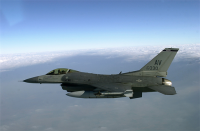
A Pentagon spokesman said that the targets of a U.S. airstrike in northwestern Syria that were several top leaders of the al Qaeda-affiliated al-Nusra Front, including the group’s spokesman Abu Firas al-Suri. Al-Suri, a Syrian national, served in the Syrian military before being forced out for Islamist leanings. He became close to bin Laden while fighting in Afghanistan, and rose to a senior position in al Qaeda in the late 1980s.
-
-
Germany to put a Syrian refugee on trial for war crimes
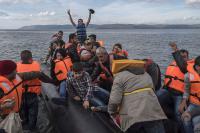
A Syrian national who arrived in Germany as a refugee has been arrested and charged with war crimes in his home country. The man is accused of leading a 150-strong armed militia which tortured civilians, kidnapped others for ransom, and enriched itself by selling looted art.
-
-
What is a dirty bomb and how dangerous is it?
The worrying news that individuals affiliated with the so-called Islamic State have undertaken hostile surveillance at a Belgian nuclear research facility has created growing speculation about the group’s nuclear ambitions. There are no indications that a terrorist group has obtained any fissile material to date. An easier option for a terrorist group would be to build a dirty bomb or, technically, a radiological dispersal device. This is the reason for sensible concern, rather than hysterical speculation about Islamic State’s recent activities in Belgium and, especially, Iraq and Syria. After all, without an effective government, it is unclear who controls the many radioactive sources in the region.
-
-
Terrorists may have entered Europe hiding among asylum-seekers: EU border police
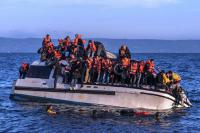
Frontex, the EU’s border police, has said that terrorists may have entered Europe by hiding among asylum seekers. Frontex noted that two of the bombers in last November’s Paris attacks made it to the continent in a smuggling boat from Turkey. “As the vast majority of migrants arrive undocumented, screening activities are essential to properly verify their declaration of nationality,” the report says.
-
-
Better tactics for dealing with terrorist threats to cities
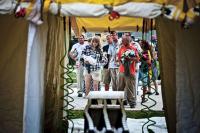
Counter-terrorism technologies and diverse partnerships are essential when dealing with terrorist threats in cities. The findings follow the European Commission-funded TACTICS project to create a better counter-terrorism system for EU member states.
-
-
U.S. national security decision making need to be leaner, more-focused
A leaner, more-focused national security decision-making system can help the United States succeed in a period of tumultuous change, according to a new report. Increasing the effectiveness and efficiency of the National Security Council (NSC) is necessary as the country contends with many more state and nonstate actors, around-the-clock public scrutiny, and exploding nontraditional threats, according to the report.
-
-
ISIS uses mustard gas against Syrian forces in battle for airport
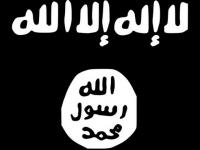
ISIS has used mustard gas against Bashar al-Assad’s forces in battles at a key airport in eastern Syria. The chemical weapons were used as part of the militants’ effort on Monday to recapture the military airport at Deir ez-Zor. UN officials confirmed that ISIS has the capability to build and use chemical weapons in Syria and Iraq.
-
-
Rising world military spending in 2015
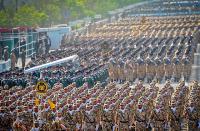
World military expenditure totaled almost $1.7 trillion in 2015, an increase of 1 percent in real terms from 2014. The increase reflects continuing growth in Asia and Oceania, Central and Eastern Europe, and some Middle Eastern states. The decline in spending in the West is also levelling off. At the same time, spending decreased in Africa, and Latin America and the Caribbean. Thus, the global military expenditure picture is mixed. The United States remained by far the world’s biggest spender in 2015, despite its expenditure falling by 2.4 per cent to $596 billion.
-
-
Islamist radicals from Muslim countries tend to have engineering qualifications
Islamist radicals born and educated in Muslim countries are seventeen times more likely to have an engineering qualification than the general population in these countries. A new book, which relies on a study of over 800 members of violent Islamist groups, challenges a widely held view that many terrorists are “poor, ignorant and have nothing to lose,” according to its authors. “There is little doubt that violent Islamist radicals are vastly more educated than the general population born and educated in the Muslim world, and engineers are dramatically over-represented,” the authors say.
-
-
Leader of Nigeria’s Islamist Ansaru group arrested in Nigeria
Khalid al-Barnawi, the leader of Nigeria’s Ansaru jihadist group, a Boko Haram splinter group ideologically aligned with al-Qaeda in the Islamic Maghreb, has been arrested, a Nigerian army spokesman said on Sunday. Al-Barnawi, 47, was born as Usman Umar Abubakar in Biu town in northeast Borno state. He is one of three Nigerians listed by Washington in 2012 as “specially designated global terrorists.
-
-
ISIS planning to use drones for radioactive attacks on Western cities
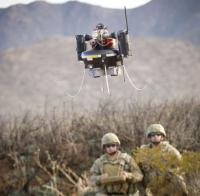
Prime Minister David Cameron warned that ISIS terrorists are planning to use drones to spray nuclear material over Western cities in a lethal “dirty bomb” attack. Security experts are worried about jihadists buying simple drones, which are widely available, and use them to carry radioactive material into the centers of large cities in attacks which would kill thousands and contaminate large sections of cities, making entire areas uninhabitable for years.
-
-
Al-Shabaab leader in Somalia killed in U.S. strike
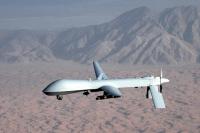
Hassan Ali Dhoore, a senior leader of the Somali al-Shabaab Islamist group, was killed by a U.S. drone strike on Thursday. On 5 March a U.S. air strike killed more than a 100 al-Shabaab fighters in one of the group’s training facilities.
-
-
ISIS rocket expert killed in U.S. strike
Jasim Khadijah, a former Iraqi officer in Saddam Hussein’s army who joined ISIS and led the organization’s rocket development effort, was killed by a drone strike in northern Iraq Sunday. Khadijah was responsible for a rocket attack last month on a U.S. military base near the town of Makhmour, located between Mosul and Kirkuk. That attack killed marine staff sergeant Louis Cardin and wounded eight others.
-
-
ISIS has changed international law
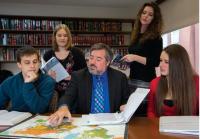
Two years ago, virtually no one had heard of the Islamic State of Iraq and Syria (ISIS). In a January 2014 New Yorker interview, President Obama dismissed the group as “Junior Varsity.” Since then, ISIS has emerged as one of the most wealthy, powerful, and dangerous terrorist organizations that ever existed. UN Security Council Resolution 2249, adopted in November 2015, will likely be viewed as confirming that use of force in self-defense is now permissible against “nonstate actors” such as terrorists when the territorial state is unable to suppress the threat that they pose. The implication of this newly accepted change in the international law of self-defense is that any nation can now lawfully use force against deadly nonstate actors in another country if the government of that country is unable or unwilling to suppress the threat within its borders. With so many potential targets in so many countries – the U.S. terrorist organizations list, for example, includes fifty-eight terrorist groups headquartered in thirty-five different countries (in addition to ISIS in Syria/Iraq) — one must ask whether the possibility of abuse will ultimately outweigh the benefits of weakening ISIS.
-
More headlines
The long view
Kinetic Operations Bring Authoritarian Violence to Democratic Streets
Foreign interference in democracies has a multifaceted toolkit. In addition to information manipulation, the tactical tools authoritarian actors use to undermine democracy include cyber operations, economic coercion, malign finance, and civil society subversion.
Patriots’ Day: How Far-Right Groups Hijack History and Patriotic Symbols to Advance Their Cause, According to an Expert on Extremism
Extremist groups have attempted to change the meaning of freedom and liberty embedded in Patriots’ Day — a commemoration of the battles of Lexington and Concord – to serve their far-right rhetoric, recruitment, and radicalization. Understanding how patriotic symbols can be exploited offers important insights into how historical narratives may be manipulated, potentially leading to harmful consequences in American society.
Trump Aims to Shut Down State Climate Policies
President Donald Trump has launched an all-out legal attack on states’ authority to set climate change policy. Climate-focused state leaders say his administration has no legal basis to unravel their efforts.
Vaccine Integrity Project Says New FDA Rules on COVID-19 Vaccines Show Lack of Consensus, Clarity
Sidestepping both the FDA’s own Vaccines and Related Biological Products Advisory Committee and the CDC’s Advisory Committee on Immunization Practices (ACIP), two Trump-appointed FDA leaders penned an opinion piece in the New England Journal of Medicine to announce new, more restrictive, COVID-19 vaccine recommendations. Critics say that not seeking broad input into the new policy, which would help FDA to understand its implications, feasibility, and the potential for unintended consequences, amounts to policy by proclamation.
Twenty-One Things That Are True in Los Angeles
To understand the dangers inherent in deploying the California National Guard – over the strenuous objections of the California governor – and active-duty Marines to deal with anti-ICE protesters, we should remind ourselves of a few elementary truths, writes Benjamin Wittes. Among these truths: “Not all lawful exercises of authority are wise, prudent, or smart”; “Not all crimes require a federal response”; “Avoiding tragic and unnecessary confrontations is generally desirable”; and “It is thus unwise, imprudent, and stupid to take actions for performative reasons that one might reasonably anticipate would increase the risks of such confrontations.”
Luigi Mangione and the Making of a ‘Terrorist’
Discretion is crucial to the American tradition of criminal law, Jacob Ware and Ania Zolyniak write, noting that “lawmakers enact broader statutes to empower prosecutors to pursue justice while entrusting that they will stay within the confines of their authority and screen out the inevitable “absurd” cases that may arise.” Discretion is also vital to maintaining the legitimacy of the legal system. In the prosecution’s case against Luigi Mangione, they charge, “That discretion was abused.”
